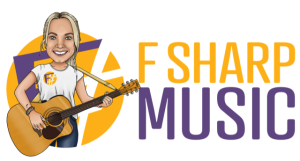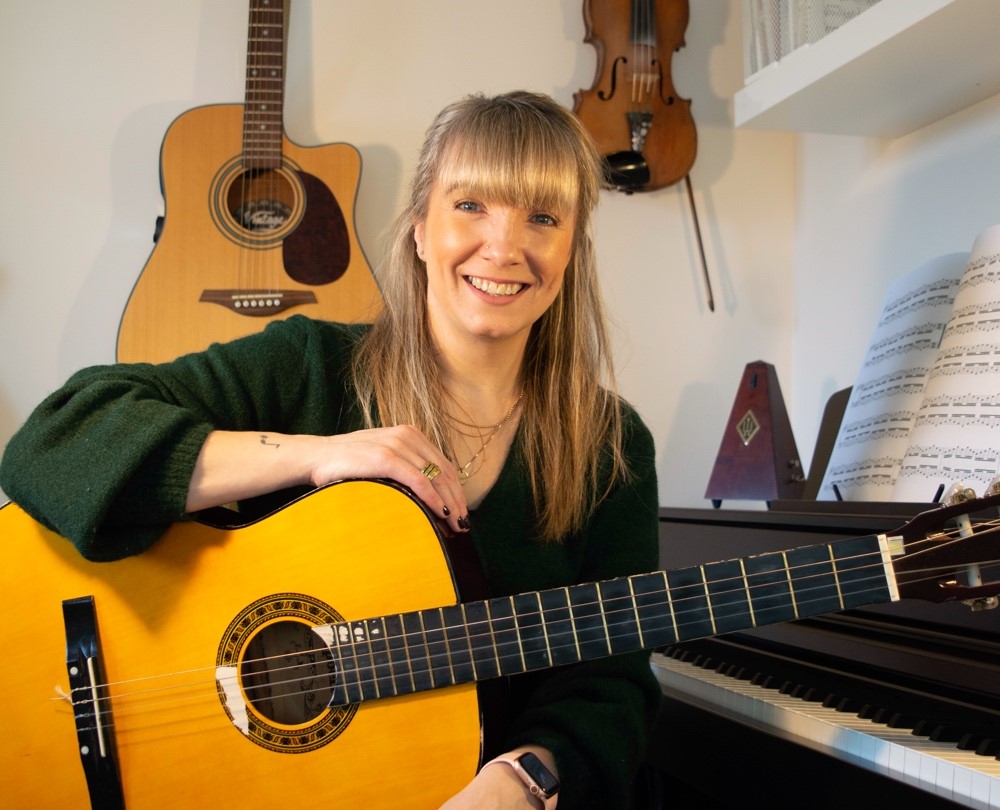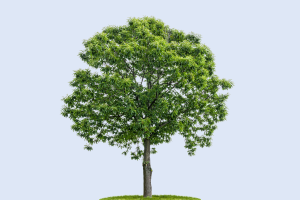
Fiona Sharp founded F Sharp Music in 2013. It provides individually designed music sessions for people of all ages and disabilities. F Sharp Music are one of our Delivery Partners. Here, we chat to Fiona about her work.
When did your love of music start, and how?
Music was very much part of my upbringing, and I was always interested in it.
As a teenager I was very keen on drama and music and I was a member of the National Youth Music Theatre as well as local drama groups in Edinburgh.
Classical music has always been a big part of my life. I learned classical violin from the age of seven, and piano when I was three thanks to my mum being a piano teacher. Singing was also a big part of my childhood.
What gave you the idea to use music as therapy?
In my final year at school, I ended up shadowing the music therapist at The Royal Blind School in Edinburgh. That’s really what inspired me to go down this path and I ended up studying music down in London: it was a general music degree, but I was able to do a course in music therapy, and that inspired me further to look at taking it forward as a career.
I moved back to up Scotland, to Fife, and I ended up working as a Music Practitioner for a charity called Sense Scotland. I worked in their residential services across the east coast of Scotland providing one-to-one and group music sessions.
At that time, they predominantly supported people who are Deafblind. The majority of clients I worked with at that time had been in long-stay hospitals most of their lives, and had only recently moved into the community. I absolutely loved this work, mainly because the participants communication skills were fairly nonexistent at that stage, and I found that music and vibration really helped develop those skills. It was amazing to see the developments made through music however big or small they were. Following this I ended up doing a diploma in Deafblind Studies.
I worked with Sense Scotland for over six years and loved it. But by that point I was nearly 30 and felt I needed to move on and explore other opportunities within the sector. So that’s when I decided to take the big jump and set up F-Sharp Music.
So you started F Sharp in 2013: how has it developed since then?
It’s grown a huge amount, and I have to admit the growth in the business has been partly thanks to the pandemic. Before the pandemic I was working entirely on my own. Due to the high demand in music sessions over the past two years I have had to bring in four music specialists to help take on referrals. This has also meant that we are now covering many regions of Scotland rather than just Fife and Edinburgh as well as supporting people with a wide range of learning and physical disabilities, and all ages.
Over the past two years we have also set up an online shop selling F Sharp Music resources, sensory instruments and merchandise. We have a YouTube channel and social media pages.
What sorts of things do you do?
It very much depends on the person as we structure our music sessions around the individual we are supporting. We can do something as basic as sing songs together or interact with some percussive instruments, or we have some participants that want to learn to play an instrument, record themselves or be in a band.
We can use the conventional way of learning to play an instrument and learning to read music. But also, for those participants who may struggle to understand music notation, we use a system called Figurenotes. This is a system that uses colour and shape to help you learn to read music. So, for example, if you’re learning to play the piano or the guitar, you put stickers on your instrument – in different shapes and colours – and then the music is also portrayed in the same range of colours and the shapes, and you literally play what you see. So straightaway, you can play a song.
It was devised in Helsinki by two music teachers at the Resonaari Music Centre, who provide music lessons for children and adults with learning and physical disabilities. Originally Figurenotes was designed for people on the Autistic Spectrum, but it is now a music notation system which anyone can access.
The organisation Drake Music Scotland brought the concept over to Scotland in the mid 2000s, and it has just exploded as a music notation system throughout Scotland and the rest of the UK. Schools use it across the country and the BBC’s Ten Pieces school program also has adopted the system. It’s an amazing concept which works in three stages allowing the musician to eventually learn conventional music notation.
What are some of the ways that music can help people, beyond simply being an enjoyable experience?
There are many, many ways music can help people. It obviously depends on the person and their specific needs. For example, for people with more profound disabilities, who may have difficulties with communication, music can really help develop those skills through call and response work and choice making. You can also build up a conversation through instrumental playing.
For people who may have anxiety or depression, music can really help with self-expression and creativity as well as helping to build up confidence and social skills.
It can also develop counting skills, motor skills, listening skills and concentration. If you use Figurenotes notation system, you’ve got colour matching and pattern recognition as well as counting and rhythm.
Music can also just be a ‘feel-good’ activity.

Above: Fiona Sharp
Where do you want to take F Sharp Music in the near future?
Well here’s the thing, when I was at school I was told by my careers advisor that music to me was a hobby not a talent and I should consider working in a shop instead of studying music…I didn’t listen to her! When I did go and study music at university I was then told that being a music specialist/therapist would always be a part time job as it’s very difficult to get work in this field. Somehow over the past 17 years I have built up my own music practice and now have a team of amazing music specialists covering large parts of the country, which I never thought would be possible given what I was told in the past.
I suppose that’s a lesson for all of us: go with your gut instinct and your love and passion for what you enjoy doing, and don’t let anyone stop you or put you off achieving your dreams. With that said, I can only wish for a future for F Sharp Music which is as successful as it has been over the past 11 years. I am always looking at ways of expanding the business and bringing in new ideas and interests. Our latest project which we are aiming to start launching next year is our Music Wellness sessions and resources.
This will hopefully include sound therapy/sound baths, music relaxation, sensory music and nutrition and wellbeing which is another area I am very passionate about.
Sound therapy/sound bathing uses different tones and pitches to help relaxation. The person is in a comfortable and relaxed position either lying down or in a comfortable chair. The sound therapist will then play a selection of instruments (crystal singing bowls, Tibetan singing bowls, ocean drums, rain sticks, gongs, finger cymbals) which produce very pure tones and relaxing sounds, and can completely relax you and help you process some of the emotions you might be experiencing. For some people it can put them into a meditative, trance state. I actually tried it myself a few weeks ago, and it was unbelievable. Until you experience it, you can’t really explain it, but you feel so relaxed at the end of the session, as if you’re walking on air. This is a great activity for people who may have anxiety, depression, Autism, or sleep insomnia. I personally think it’s a wonderful thing to experience and I very much want to introduce it as an activity to F Sharp Music over the next year.
5 skills that can be developed through music
Motor skills – by learning to play an instrument.
Language and communication – both through singing and by stimulating the necessary parts of the brain.
Collaboration skills – by singing and playing with other people.
Maths and counting – from beats in a bar to patterns within a piece, numbers are a fundamental component of music.
Self-expression and creativity – music is the perfect medium in which to explore and experiment.



